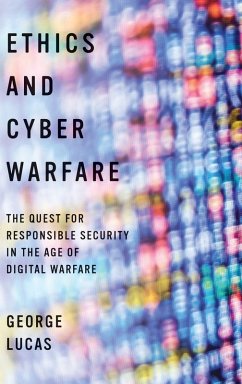George Lucas
Ethics and Cyber Warfare
The Quest for Responsible Security in the Age of Digital Warfare
George Lucas
Ethics and Cyber Warfare
The Quest for Responsible Security in the Age of Digital Warfare
- Gebundenes Buch
- Merkliste
- Auf die Merkliste
- Bewerten Bewerten
- Teilen
- Produkt teilen
- Produkterinnerung
- Produkterinnerung
"State sponsored hacktivism" constitutes a wholly new alternative to conventional armed conflict. This book explores the ethical and legal dimensions of this "soft" mode warfare grounded in a broad revisionist approach to military ethics and "just war theory" that results in a new code of ethics for today's "cyber warriors."
Andere Kunden interessierten sich auch für
![The ethics of war The ethics of war]() A. J. CoatesThe ethics of war111,99 €
A. J. CoatesThe ethics of war111,99 €![The ethics of war The ethics of war]() A. J. CoatesThe ethics of war24,99 €
A. J. CoatesThe ethics of war24,99 €![An Ethical Study on Nuclear Warfare and the Possibility of Deterrence An Ethical Study on Nuclear Warfare and the Possibility of Deterrence]() Silambarasan SibiyonAn Ethical Study on Nuclear Warfare and the Possibility of Deterrence15,95 €
Silambarasan SibiyonAn Ethical Study on Nuclear Warfare and the Possibility of Deterrence15,95 €![The Art Of Hybrid War The Art Of Hybrid War]() J. J. PatrickThe Art Of Hybrid War10,99 €
J. J. PatrickThe Art Of Hybrid War10,99 €![Being Human Being Human]() Lewis DartnellBeing Human9,99 €
Lewis DartnellBeing Human9,99 €![Rage Rage]() Ed AdamsRage15,99 €
Ed AdamsRage15,99 €![Masculinities and the Decline of Traditional Warfare Masculinities and the Decline of Traditional Warfare]() Niklas KuckMasculinities and the Decline of Traditional Warfare17,95 €
Niklas KuckMasculinities and the Decline of Traditional Warfare17,95 €-
-
-
"State sponsored hacktivism" constitutes a wholly new alternative to conventional armed conflict. This book explores the ethical and legal dimensions of this "soft" mode warfare grounded in a broad revisionist approach to military ethics and "just war theory" that results in a new code of ethics for today's "cyber warriors."
Produktdetails
- Produktdetails
- Verlag: Oxford University Press
- Seitenzahl: 208
- Erscheinungstermin: 13. Dezember 2016
- Englisch
- Abmessung: 236mm x 155mm x 23mm
- Gewicht: 454g
- ISBN-13: 9780190276522
- ISBN-10: 0190276525
- Artikelnr.: 47508448
- Herstellerkennzeichnung
- Libri GmbH
- Europaallee 1
- 36244 Bad Hersfeld
- gpsr@libri.de
- Verlag: Oxford University Press
- Seitenzahl: 208
- Erscheinungstermin: 13. Dezember 2016
- Englisch
- Abmessung: 236mm x 155mm x 23mm
- Gewicht: 454g
- ISBN-13: 9780190276522
- ISBN-10: 0190276525
- Artikelnr.: 47508448
- Herstellerkennzeichnung
- Libri GmbH
- Europaallee 1
- 36244 Bad Hersfeld
- gpsr@libri.de
George Lucas is currently a Visiting Distinguished Research Professor at the John J. Reilly Center for Science, Technology & Values at Notre Dame University. He is an internationally recognized authority in the field of military and applied ethics, focusing in particular upon ethics and emerging military technologies. Recent books include Anthropologists in Arms (2009) and Military Ethics: What Everyone Needs to Know (OUP, 2015). He is editor of the Routledge Handbook of Military Ethics (2015).
* CONTENTS * Preface ix * Acknowledgments xiii * Introduction: Crime or Warfare?
1 * 1. Cyber (In)security: Threat Assessment in the Cyber Domain
16 * What, When, and Where?
16 * How?
18 * Why?
19 * Three Ways of Being a Hacktivist
21 * Conventional Warfare
22 * Unrestricted Warfare
24 * State
Sponsored Hacktivism as a New Form of Warfare
27 * 2. Is There a Role for Ethics or Law in Cyber Conflict?
33 * Irregular War and Cyberwar
33 * Ethics and "Folk Morality"
35 * Ethics and the Law
40 * Ethics and Just War Theory
42 * Strategic Plan of the Book
45 * Applying Moral Theories in the Cyber Domain
48 * 3. The Tallinn Manual: International Law in the Aftermath of Estonia
57 * International Law Applicable to Stuxnet
58 * International Law and State
Sponsored Hacktivism
61 * The Tallinn Manual
64 * International Law and the Estonian Cyber attacks
68 * "There Oughta' Be a Law!"
73 * Why the Tallinn Manual Failed
76 * 4. Genuine Ethics versus "Folk Morality" in Cyberspace
85 * The Advantages of Taking "the Moral Point of View"
86 * The Challenge of Folk Morality for Authentic Ethics
88 * The Origins of Universal Moral Norms
91 * Thinking Ethically about Conflict in the Cyber Domain
96 * Just War Theory and the Morality of Exceptions
98 * Jus in Bello and Professional Military Ethics
101 * Jus in Silico: Ethics and Just War Theory in the Cyber Domain
102 * 5. If Aristotle Waged Cyberwar: How Norms Emerge from Practice
109 * Distinguishing between Laws and Norms
112 * The Methodology of Uncertainty: How Do Norms "Emerge?"
113 * Do Emergent Moral Norms Provide Effective Governance?
119 * 6. Privacy, Anonymity, and the Rise of State
Sponsored Hacktivism
125 * Emergent Norms and the Rise of State
Sponsored Hacktivism
126 * The Cunning of History
128 * Permissible Preemptive Cyber Self
Defense
129 * Privacy, Anonymity, and the Sectors of Vulnerability
130 * Cyber security Measures for Individuals
131 * Privacy versus Anonymity
133 * A Limited Justification for Anonymity
135 * Restricting Anonymity while Preserving Privacy
137 * New "Rules of the Road" for Cyber Navigation
138 * 7. NSA Management Directive #424: Anticipatory National Self
Defense
142 * Preventive War
143 * Initial Public Response
147 * The Dilemma of Edward Snowden
148 * Government Deception and Public Trust
150 * Defending National Boundaries And Personal Liberties
151 * State Norms for Respecting Sovereignty and Attaining Security
153 * Conclusion: Toward a Code of Ethics for Cyber Warriors
157 * References
167 * Index
175
1 * 1. Cyber (In)security: Threat Assessment in the Cyber Domain
16 * What, When, and Where?
16 * How?
18 * Why?
19 * Three Ways of Being a Hacktivist
21 * Conventional Warfare
22 * Unrestricted Warfare
24 * State
Sponsored Hacktivism as a New Form of Warfare
27 * 2. Is There a Role for Ethics or Law in Cyber Conflict?
33 * Irregular War and Cyberwar
33 * Ethics and "Folk Morality"
35 * Ethics and the Law
40 * Ethics and Just War Theory
42 * Strategic Plan of the Book
45 * Applying Moral Theories in the Cyber Domain
48 * 3. The Tallinn Manual: International Law in the Aftermath of Estonia
57 * International Law Applicable to Stuxnet
58 * International Law and State
Sponsored Hacktivism
61 * The Tallinn Manual
64 * International Law and the Estonian Cyber attacks
68 * "There Oughta' Be a Law!"
73 * Why the Tallinn Manual Failed
76 * 4. Genuine Ethics versus "Folk Morality" in Cyberspace
85 * The Advantages of Taking "the Moral Point of View"
86 * The Challenge of Folk Morality for Authentic Ethics
88 * The Origins of Universal Moral Norms
91 * Thinking Ethically about Conflict in the Cyber Domain
96 * Just War Theory and the Morality of Exceptions
98 * Jus in Bello and Professional Military Ethics
101 * Jus in Silico: Ethics and Just War Theory in the Cyber Domain
102 * 5. If Aristotle Waged Cyberwar: How Norms Emerge from Practice
109 * Distinguishing between Laws and Norms
112 * The Methodology of Uncertainty: How Do Norms "Emerge?"
113 * Do Emergent Moral Norms Provide Effective Governance?
119 * 6. Privacy, Anonymity, and the Rise of State
Sponsored Hacktivism
125 * Emergent Norms and the Rise of State
Sponsored Hacktivism
126 * The Cunning of History
128 * Permissible Preemptive Cyber Self
Defense
129 * Privacy, Anonymity, and the Sectors of Vulnerability
130 * Cyber security Measures for Individuals
131 * Privacy versus Anonymity
133 * A Limited Justification for Anonymity
135 * Restricting Anonymity while Preserving Privacy
137 * New "Rules of the Road" for Cyber Navigation
138 * 7. NSA Management Directive #424: Anticipatory National Self
Defense
142 * Preventive War
143 * Initial Public Response
147 * The Dilemma of Edward Snowden
148 * Government Deception and Public Trust
150 * Defending National Boundaries And Personal Liberties
151 * State Norms for Respecting Sovereignty and Attaining Security
153 * Conclusion: Toward a Code of Ethics for Cyber Warriors
157 * References
167 * Index
175
* CONTENTS * Preface ix * Acknowledgments xiii * Introduction: Crime or Warfare?
1 * 1. Cyber (In)security: Threat Assessment in the Cyber Domain
16 * What, When, and Where?
16 * How?
18 * Why?
19 * Three Ways of Being a Hacktivist
21 * Conventional Warfare
22 * Unrestricted Warfare
24 * State
Sponsored Hacktivism as a New Form of Warfare
27 * 2. Is There a Role for Ethics or Law in Cyber Conflict?
33 * Irregular War and Cyberwar
33 * Ethics and "Folk Morality"
35 * Ethics and the Law
40 * Ethics and Just War Theory
42 * Strategic Plan of the Book
45 * Applying Moral Theories in the Cyber Domain
48 * 3. The Tallinn Manual: International Law in the Aftermath of Estonia
57 * International Law Applicable to Stuxnet
58 * International Law and State
Sponsored Hacktivism
61 * The Tallinn Manual
64 * International Law and the Estonian Cyber attacks
68 * "There Oughta' Be a Law!"
73 * Why the Tallinn Manual Failed
76 * 4. Genuine Ethics versus "Folk Morality" in Cyberspace
85 * The Advantages of Taking "the Moral Point of View"
86 * The Challenge of Folk Morality for Authentic Ethics
88 * The Origins of Universal Moral Norms
91 * Thinking Ethically about Conflict in the Cyber Domain
96 * Just War Theory and the Morality of Exceptions
98 * Jus in Bello and Professional Military Ethics
101 * Jus in Silico: Ethics and Just War Theory in the Cyber Domain
102 * 5. If Aristotle Waged Cyberwar: How Norms Emerge from Practice
109 * Distinguishing between Laws and Norms
112 * The Methodology of Uncertainty: How Do Norms "Emerge?"
113 * Do Emergent Moral Norms Provide Effective Governance?
119 * 6. Privacy, Anonymity, and the Rise of State
Sponsored Hacktivism
125 * Emergent Norms and the Rise of State
Sponsored Hacktivism
126 * The Cunning of History
128 * Permissible Preemptive Cyber Self
Defense
129 * Privacy, Anonymity, and the Sectors of Vulnerability
130 * Cyber security Measures for Individuals
131 * Privacy versus Anonymity
133 * A Limited Justification for Anonymity
135 * Restricting Anonymity while Preserving Privacy
137 * New "Rules of the Road" for Cyber Navigation
138 * 7. NSA Management Directive #424: Anticipatory National Self
Defense
142 * Preventive War
143 * Initial Public Response
147 * The Dilemma of Edward Snowden
148 * Government Deception and Public Trust
150 * Defending National Boundaries And Personal Liberties
151 * State Norms for Respecting Sovereignty and Attaining Security
153 * Conclusion: Toward a Code of Ethics for Cyber Warriors
157 * References
167 * Index
175
1 * 1. Cyber (In)security: Threat Assessment in the Cyber Domain
16 * What, When, and Where?
16 * How?
18 * Why?
19 * Three Ways of Being a Hacktivist
21 * Conventional Warfare
22 * Unrestricted Warfare
24 * State
Sponsored Hacktivism as a New Form of Warfare
27 * 2. Is There a Role for Ethics or Law in Cyber Conflict?
33 * Irregular War and Cyberwar
33 * Ethics and "Folk Morality"
35 * Ethics and the Law
40 * Ethics and Just War Theory
42 * Strategic Plan of the Book
45 * Applying Moral Theories in the Cyber Domain
48 * 3. The Tallinn Manual: International Law in the Aftermath of Estonia
57 * International Law Applicable to Stuxnet
58 * International Law and State
Sponsored Hacktivism
61 * The Tallinn Manual
64 * International Law and the Estonian Cyber attacks
68 * "There Oughta' Be a Law!"
73 * Why the Tallinn Manual Failed
76 * 4. Genuine Ethics versus "Folk Morality" in Cyberspace
85 * The Advantages of Taking "the Moral Point of View"
86 * The Challenge of Folk Morality for Authentic Ethics
88 * The Origins of Universal Moral Norms
91 * Thinking Ethically about Conflict in the Cyber Domain
96 * Just War Theory and the Morality of Exceptions
98 * Jus in Bello and Professional Military Ethics
101 * Jus in Silico: Ethics and Just War Theory in the Cyber Domain
102 * 5. If Aristotle Waged Cyberwar: How Norms Emerge from Practice
109 * Distinguishing between Laws and Norms
112 * The Methodology of Uncertainty: How Do Norms "Emerge?"
113 * Do Emergent Moral Norms Provide Effective Governance?
119 * 6. Privacy, Anonymity, and the Rise of State
Sponsored Hacktivism
125 * Emergent Norms and the Rise of State
Sponsored Hacktivism
126 * The Cunning of History
128 * Permissible Preemptive Cyber Self
Defense
129 * Privacy, Anonymity, and the Sectors of Vulnerability
130 * Cyber security Measures for Individuals
131 * Privacy versus Anonymity
133 * A Limited Justification for Anonymity
135 * Restricting Anonymity while Preserving Privacy
137 * New "Rules of the Road" for Cyber Navigation
138 * 7. NSA Management Directive #424: Anticipatory National Self
Defense
142 * Preventive War
143 * Initial Public Response
147 * The Dilemma of Edward Snowden
148 * Government Deception and Public Trust
150 * Defending National Boundaries And Personal Liberties
151 * State Norms for Respecting Sovereignty and Attaining Security
153 * Conclusion: Toward a Code of Ethics for Cyber Warriors
157 * References
167 * Index
175








